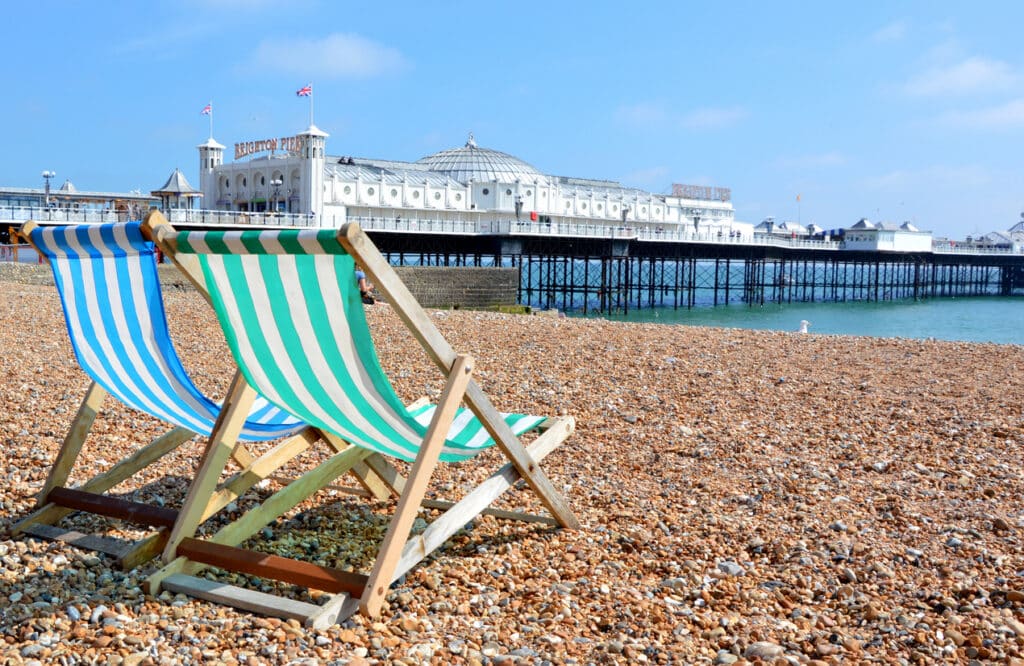Planning a quick UK getaway, a long-overdue family reunion, or just craving some proper British chips? Good news: for most short trips, U.S. citizens still don’t need a visa to visit the UK. But, in classic British fashion, there’s a twist—thanks to the new Electronic Travel Authorisation (ETA) system, you’ll want to double-check the latest rules before you hop across the pond.
Whether you’re booking a weekend in London or hosting American guests, here’s how the post-Brexit travel updates (and UK government quirks) could affect your plans—and how to avoid any “surprise, you need a form!” moments at the border.
📋 Key Updates for 2025
- As of April 2025, all U.S. citizens without British or Irish nationality must apply for an ETA before traveling to the UK—even for short visits.
- Once approved, an ETA lets you enter the UK multiple times over two years (or until your passport expires), with each visit up to six months.
- The ETA application fee increased from £10 to £16 in April 2025, so factor this into your travel planning.
Do U.S. citizens need a visa? UK entry requirements explained
Visiting the United Kingdom as an American is still refreshingly straightforward—but the details matter. Before you (or your stateside guests) breeze through border control, it’s smart to know exactly what you can—and can’t—do as a visa-free visitor.
Visa-free, but not carte blanche
Citizens of the United States of America (USA) still enjoy visa-free entry for tourism, short business trips, and family visits, as long as each stay is no longer than six months. You’ll need a valid U.S. passport and, since 2025, an approved ETA (more on that in the next section). But visa-free doesn’t mean “do whatever you like”—there are clear limits on what’s allowed.
Permitted activities on a visitor entry
- Tourism: You can explore, sightsee, and sample every English breakfast you find.
- Visiting family/friends: Reunite with loved ones, celebrate milestones, or just soak up British banter.
- Short-term business: Attend conferences, negotiate deals, meet clients, or scout business opportunities—so long as you aren’t taking up actual UK employment.
- Short-term study: Enroll in recreational or short courses (up to 30 days), but not for full degrees or long-term study.
What’s off-limits without a visa
- Work: Any paid work, internships, or employment with a UK-based company (even remotely) requires a proper work visa.
- Long-term stay: You can’t string together multiple six-month visits to “live” in the UK; border officers will notice if you’re effectively residing.
- Marriage or civil partnership: You’ll need a marriage visitor visa if tying the knot is the main purpose of your trip.
- Healthcare tourism: Access to NHS services is very limited for visitors—bring travel insurance.
Proving your intentions
UK border officers are famously polite, but also famously thorough. Even if you’re “just visiting,” you may be asked about:
- Your plans and intended length of stay.
- Proof of onward or return travel.
- Evidence of accommodation (hotel bookings, invitation letters, etc.)
- Access to enough funds for your trip.
- Why you’re not planning to work or study long-term.
If your answers are vague or inconsistent—or your travel history suggests you’re stretching the rules—you might be refused entry.
Comparing UK rules with other countries
Unlike the U.S. ESTA or Canada’s eTA, the UK’s approach is generous on length (six months vs. 90 days in the Schengen Area or U.S.), but strict about your activities. You’re a guest, not a resident. Frequent visitors or digital nomads: the UK won’t issue a “tourist pass” for indefinite stays.
You don’t need a visa for most visits, but the UK takes the terms of entry seriously. Bring your documents, answer questions confidently, and stick to your visitor status—and you’ll be sipping tea in no time.
💡 Pro Tip:
If you have a history of long stays, multiple visits, or dual intent (e.g. business + family), carry extra documentation to back up your story and avoid awkward border questions.
Electronic Travel Authorisation (ETA): What it means for US travelers
The UK’s new Electronic Travel Authorization (ETA) system is now a must for almost all American visitors. Think of it as the UK’s answer to America’s ESTA or Canada’s eTA—an extra security step before you pack your bags, not a full-blown visa.
The ETA is all about security and efficiency: it lets the UK government screen travelers in advance, streamline border crossings, and keep out anyone who might be a risk—all before you even leave home. It’s part of the Home Office’s push to modernize borders and reduce last-minute surprises at passport control.
Who needs an ETA?
All U.S. passport holders visiting the UK for tourism, business, or family reasons now need an approved ETA before boarding. The rule covers most visa-exempt travelers (not just Americans), and it’s fully live as of 2025.
How is ETA different from a visa?
- ETA is not a visa: It gives you pre-clearance to visit, but doesn’t allow you to work, settle, or study long-term.
- It’s fast and digital: The process is cheaper and quicker than a traditional visa, more like the U.S. ESTA or Canada’s eTA.
How (and when) to apply
- Apply online or through the ETA mobile app using your valid passport.
- Pay a small application fee (think ESTA-range, not visa prices).
- Submit travel info and answer a few security questions; some applicants may be asked for a photo or biometric details.
- Apply before your trip: Airlines will check for ETA approval at check-in—no ETA, no boarding.
💡 Pro Tip:
Apply for your ETA as soon as you have travel plans. It’s usually fast, but last-minute tech glitches (or missing paperwork) can keep you grounded.
When do US citizens actually need a visa for the UK?
While many visits are visa-free with just an ETA, there are plenty of situations where Americans do need to apply for a visa before heading to the UK. If your plans go beyond sightseeing, tea-drinking, or a quick family visit, here’s when you’ll need to get official:
You’ll need a visa if you’re planning to:
- Work: Any kind of paid work, employment contract, or self-employment—including remote work for a UK-based company.
- Stay long-term: Any visit longer than six months, or if you’re looking to settle in the UK.
- Study: Enrolling in a full-time degree or even some short-term academic programs (always check the latest rules).
- Join family: Moving to live with a spouse, partner, child, or other family member who’s a UK resident or citizen.
- Settle permanently: Applying for indefinite leave to remain, citizenship, or similar statuses.
Types of UK visas Americans commonly apply for
- Standard visitor visa: For situations where you do need a visa to visit, like certain types of study or special professional events.
- Student visa: For enrolling in universities or longer educational programs.
- Work visas: Includes Skilled Worker, Temporary Worker, and Innovator/Start-Up visas—each with its own eligibility and paperwork.
- Family visas: For joining or reuniting with British or settled family members.
What you’ll need:
The application process usually requires:
- A valid U.S. passport
- Supporting documents (like proof of finances, acceptance letters, job offers, or relationship evidence)
- Application fees and sometimes a biometric appointment
A Note on EEA and British connections:
If you have family ties to the EEA, British citizens, or dual nationality, your eligibility and visa route could be different—always check gov.uk for the latest, as post-Brexit rules are constantly evolving.
💡 Pro Tip:
Always apply early and gather more documents than you think you’ll need—UK immigration loves evidence, and missing paperwork can slow things down (or send you back to square one).
Beyond England: UK, Ireland, and regional border rules
If your travels take you beyond London—whether to Scotland, Wales, or Northern Ireland—the entry requirements remain the same for U.S. visitors. Your ETA and U.S. passport cover you across the entire United Kingdom.
What about the Republic of Ireland?
- The Republic of Ireland is a separate country, part of the EU, and has its own entry rules. U.S. citizens can usually visit visa-free for short stays, but you won’t use a UK ETA or UK visa—just your passport.
- Crossing between Northern Ireland (UK) and the Republic of Ireland is straightforward, but you’ll technically be crossing an international border, so always bring your travel documents.
Irish passport holders and dual citizens
- If you have an Irish passport, you’ll have additional travel rights within the UK and EU.
- U.S. citizens without Irish nationality should follow the ETA and visa process for both the UK and Ireland, depending on where you’re headed.
Brexit and border updates
Since Brexit, free movement between the UK and EEA countries is no longer automatic. Your UK ETA won’t work for France, Spain, or other Schengen countries—be sure to check those entry requirements before you go.
💡 Pro Tip:
If you’re planning to travel between the UK and Ireland, or onward to Europe, double-check your passport, ETA, and visa needs for each leg. A little preparation goes a long way—especially at border control.
Travel light, travel right
With the ETA now in place, visiting the UK is still a breeze for Americans—provided you check the rules, gather your docs, and maybe practice your best “queueing politely” face. The real secret? A little prep goes a long way, and leaves you free to soak up every castle, curry, and countryside view.
Sorting out the travel side? Let Bright!Tax handle the tax side—so your time abroad stays fun, not frazzled. Planning a move, juggling cross-border life, or just want less paperwork and more passport stamps? Drop us a line and let’s make your international plans simple (and maybe even a bit more British).
Frequently Asked Questions
-
Do US citizens need a visa to visit the UK for tourism or business?
No, most U.S. citizens qualify for a visa waiver and can visit the UK for up to six months for tourism, business, or family visits—no visa required, just a valid passport and an approved ETA.
-
What is the new ETA, and does it change visa requirements?
Yes! As of 2025, U.S. travelers must apply for Electronic Travel Authorisation (ETA) before boarding a flight to the UK. The ETA isn’t a visa, but it is now required for all visa waiver travelers.
-
Can I work or study in the UK under the visa waiver program?
No, the visa waiver (and ETA) only cover short-term visits for tourism, business meetings, or family. If you plan to work, study, join family long-term, or settle, you’ll need to meet specific UK visa requirements and apply in advance.
-
What documents do I need to enter the UK as a U.S. visitor?
You’ll need your valid U.S. passport, ETA approval, and sometimes proof of onward travel, accommodation, or sufficient funds. UK border officers may ask about your travel plans to confirm you’re following visa waiver rules.
-
Is the entry process different for Scotland, Wales, or Northern Ireland?
No—the same UK visa waiver and ETA rules apply throughout the United Kingdom. If you plan to visit the Republic of Ireland, separate entry requirements apply.
-
What about U.S. citizens with British nationality or dual citizenship?
If you hold British nationality or dual citizenship, you do not need a visa or ETA to enter the UK. Simply use your British passport at the border.
-
What happens if I want to stay longer than six months, or move to the UK?
You’ll need to apply for a relevant visa—such as a work, student, or family visa—before you travel. Visa requirements can be complex, so check gov.uk for the latest guidance.
-
Where can I find the most current information about UK entry and visa requirements?
Visit the official gov.uk website for up-to-date guidance on visa waiver eligibility, ETA applications, and all UK visa requirements.

 Connect on LinkedIn
Connect on LinkedIn

